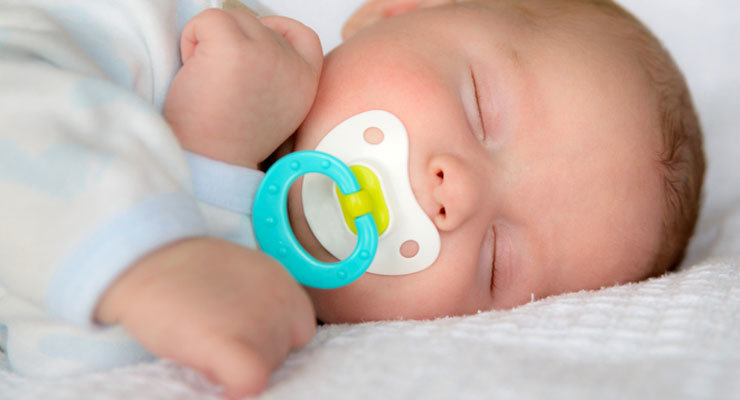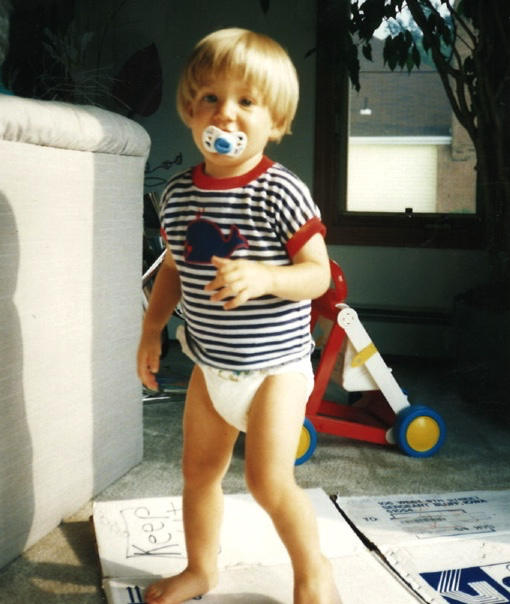Many pediatricians recommend pacifiers for infants for a variety of reasons, including the prevention of SIDS and to “pacify” a cranky baby, as the name suggests. Every baby is different – some could care less about pacifiers, some find a pacifier helpful for winding down to sleep, and some babies are absolutely addicted to their binkies. You’ve probably heard that pacifiers can cause dental issues after prolonged use, so many parents come to our office asking about when their child needs to kick the paci habit and the best way to take it away.

Dr. Erica and the American Academy of Pediatric Dentistry recommend ceasing pacifier use by the age of 2 or 2.5. Extended pacifier use can cause the top front teeth to protrude and tip forward, often times causing an “open bite” so that there is a large gap between the top and bottom teeth even when the child’s mouth is closed. In general, the earlier the pacifier is taken away, the better for the developing jaws, but long-lasting impacts on your child’s dentition are not expected if they stop using a pacifier by age 3. In general, we expect any malocclusion caused by a pacifier habit to naturally resolve on its own without intervention if taken away by age 2.5 to 3. If the pacifier persists as permanent teeth get ready to come in, an appliance or orthodontic treatment may be necessary to repair the tooth and jaw discrepancies.

The longer the habit continues, sometimes the more reliant the child becomes on the pacifier, so some doctors recommend taking it away as early as possible, with six months old being the ideal age to cease the habit. Once a child becomes emotionally attached to their paci as they get older, weaning can become even more difficult. However, most parents share with us that the process of taking away the pacifier usually ends up being a bigger deal emotionally for themselves than for their ever-adaptable child. Kids are very resilient, and although they might put up a fight for a few days, they quickly learn to leave their lives binky-free.
Here are some tried-and-true methods to help your baby kick the habit:
- Cold turkey – Although this method might seem harsh, it is usually the most effective. We recommend putting aside a few days when you know your sleep may be compromised as your child struggles to adapt to sleeping without their pacifier. Most parents say that after about 3 days, their child no longer asks for their paci.
- Broken binkies – When you snip the tip of the nipple of a pacifier, it impedes your child’s ability to create a seal in order to achieve the desired suction. Your child may become less interested in sucking on these broken pacifiers, and as long as you don’t buy any new ones, they’ll eventually accept that their pacifiers no longer work and it’s time to move on.
- Binky fairy – If your child is old enough to understand the concept of a mythical creature coming to take their binkies in exchange for a desired toy or prize, this may be a great method to motivate them to give up their pacifiers. Santa and the Easter Bunny are also known to covet old pacifiers in exchange for an extra gift if the timing is right.
- Passing the torch – If there is a new baby in your family or neighborhood, some children will understand the concept of gifting their pacifiers to the brand new babies since they are no longer the baby of the group. Some parents have even arranged for their child to drop off their pacifiers at our office or the fire station to give to new babies in need!
- Dr. Erica says so – Some children love to follow rules, and many of our patients simply give up their pacifiers after hearing Dr. Erica tell them it’s time to be a big kid. Or maybe it’s because she promises them a prize and a certificate at their next visit if they stop the habit, but either way that seems to do the trick for many of our patients!
If you have any questions or concerns regarding your child’s pacifier habit, never hesitate to bring it up at your child’s next appointment. We are here to help!
Sweet Tooth Pediatric Dentistry
583 Saybrook Road
Middletown, CT 06457
(860) 347-4681
www.sweettoothkids.com
